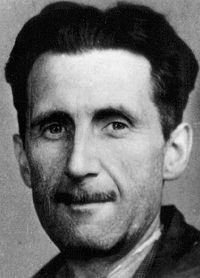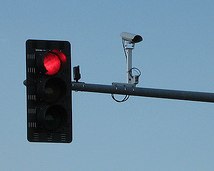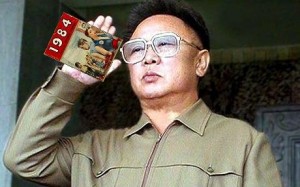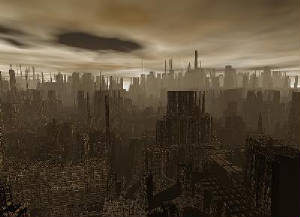Eric Blair, better known by the pen name George Orwell, was born June 23, 1903 in Motihari, Bengal (a British colony in India). His father, Richard Orwell, worked in India for the Opium Department of the Civil Service (Jones). At age one, Eric alongside his mother moved back to England. At the age of five, Blair was sent to a small Anglican parish school in Henley. From there Eric was permitted to attend St Cyprian’s School, in Eastbourne, Sussex on a scholarship. After finishing his studies at Eton, Eric joined the Indian Imperial Police in Burma. He resigned and returned to England in 1928 having grown to hate imperialism, shown in his first novel Burmese Days. He adopted his pen name in 1933, while writing for the New Adelphi. He chose a pen name for the English tradition and countryside: George is the patron saint of England (and George V was monarch at the time of Eric’s life), and the River Orwell in Suffolk was one of his most beloved English sites. Soon after the outbreak of the Spanish Civil War, Orwell volunteered to fight for the Republicans against Franco’s Nationalist uprising. Orwell was shot in the neck on May 20, 1937 (Jones). He and his wife Eileen left Spain after barely missing being arrested as “Trotskyites” when the communists moved to suppress the POUM (Workers’ Party of Marxist Unification) in June 1937. During World War II he was a member of the Home Guard and in 1941 began work for the BBC Eastern Service, mostly working on programmes to gain Indian and East Asian support for Britain’s war efforts. in 1943 he resigned to become literary editor of Tribune, the left-wing weekly then edited by Aneurin Bevan and Jon Kimche. A year later, Orwell would publish Animal Far, a still well-known sadistical approach to the classes of society. In 1949 his best-known work, the dystopian Nineteen Eighty-Four, was published. He wrote the novel during his stay on the island of Jura, off the coast of Scotland. Between 1936 and 1945 Orwell was married to Eileen O’Shaughnessy, with whom he adopted a son, Richard Horatio Blair. She died in 1945 during an operation. In the autumn of 1949, shortly before his death, he married Sonia Brownell. Orwell died at the age of 46 from tuberculosis which he had probably contracted in Paris and London. He was in and out of hospitals for the last three years of his life. Having requested burial in accordance with the Anglican rite, he was interred in All Saints’ Churchyard, Sutton Courtenay, Oxfordshire with the simple epitaph: Here lies Eric Arthur Blair, born June 25th 1903, died January 21st 1950 (Jones). During most of his career Orwell was best known for his journalism. Contemporary readers are more often introduced to Orwell as a novelist, particularly through his enormously successful titles Animal Farm and Nineteen Eighty-Four. Orwell is also known for his insights about the political implications of the use of language. Orwell’s power of language to shape reality is also reflected in his invention of Newspeak, the official language of the imaginary country of Oceania in his novel Nineteen Eighty-Four (Jones). A number of words and phrases that Orwell coined in Nineteen Eighty-Four have entered the standard vocabulary, such as “memory hole,” “Big Brother,” “Room 101,” “doublethink,” “thought police,” and “newspeak.”
Work Cited:



